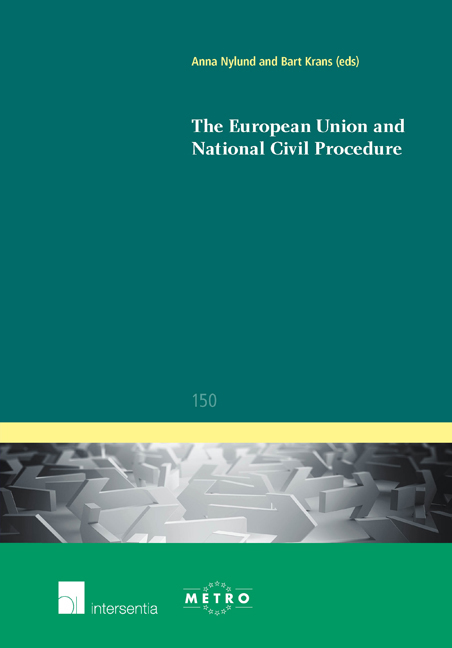Book contents
- Frontmatter
- Contents
- About the Authors
- List of Abbreviations
- The European Union and National Civil Procedure – A Rocky Road or a Smooth Process?
- Some European Challenges for Belgian Civil Procedure
- Danish Civil Procedure and the Internal Market: Impact and Challenges of Sectoral Harmonisation
- European Influences upon English Civil Justice: Tempests or Gentle Breezes?
- European Union and National Civil Procedure: The French Paradox
- The European Union and Civil Procedure from a German Perspective
- Interaction between European Law and Hungarian Civil Procedure Law
- The Impact of EU Law on Dutch Civil Procedure Law
- Norway: An Insider Outside – or an Outsider Inside – European Civil Justice
- Polish Civil Proceedings: How Much Europeanised?
- Slovenian Civil Procedure and the Transformative Power of the EU
- The Curious Incident of the Dog in the Night-Time: Europeanisation of Civil Procedure in Sweden
- Conclusions and Outlook
- Index
- Miscellaneous Endmatter
European Union and National Civil Procedure: The French Paradox
Published online by Cambridge University Press: 19 December 2017
- Frontmatter
- Contents
- About the Authors
- List of Abbreviations
- The European Union and National Civil Procedure – A Rocky Road or a Smooth Process?
- Some European Challenges for Belgian Civil Procedure
- Danish Civil Procedure and the Internal Market: Impact and Challenges of Sectoral Harmonisation
- European Influences upon English Civil Justice: Tempests or Gentle Breezes?
- European Union and National Civil Procedure: The French Paradox
- The European Union and Civil Procedure from a German Perspective
- Interaction between European Law and Hungarian Civil Procedure Law
- The Impact of EU Law on Dutch Civil Procedure Law
- Norway: An Insider Outside – or an Outsider Inside – European Civil Justice
- Polish Civil Proceedings: How Much Europeanised?
- Slovenian Civil Procedure and the Transformative Power of the EU
- The Curious Incident of the Dog in the Night-Time: Europeanisation of Civil Procedure in Sweden
- Conclusions and Outlook
- Index
- Miscellaneous Endmatter
Summary
Introduction
The phrase ‘French paradox’ usually designates a French singularity which is the relatively low incidence of cardiovascular disease in spite of the rather large proportion of saturated fats in the diet. Can this phrase also be applied to other aspects of French culture? This is the question that comes to mind when one tackles the issue of the links between European Union Law and national civil procedure.
Indeed, a priori, because of the principle of procedural autonomy of States that are members of the European Union (however tempered by the necessities of equivalence and effectiveness), the influence of the European Union on national civil procedures, and specifically on French national civil procedure, would seem extremely limited, and that should be the end of the matter. Nevertheless, some authors observe that ‘the actions taken by the European Union in the creation of the so-called ‘area of freedom, security and justice’ is considerable’ and conclude that ‘these regulations have a direct impact on French civil procedure’ (although they do not go into further detail).
These two contrasting views confirm the theory put forth by our Dutch Colleague, Mr Krans, of an ‘invisible pillar’ that is leading us, according to him, to the Europeanisation of procedural law. Naturally, this extremely interesting hypothesis6 emanating from a Dutchman leads one to consider the question as regards France. How can the situation be invisible to the naked eye of some, while it seems blindingly obvious to others? Probably because the phenomenon manifests itself mostly in indirect ways.
Because of the segmentation of the disciplines that are taught and the fields of research that are investigated, specialists tend to ignore problems that are part of other academic fields. Thus, for example, in France, conflicts of jurisdiction are traditionally studied by internationalists and consumer law procedure by consumer law specialists. This is the reason why, notably in these fields where the work done by the European Union is considerable, its greater consequences on the general theory of private judicial law are not really studied. Although they are alluded to here and there, they are never studied in depth.
- Type
- Chapter
- Information
- The European Union and National Civil Procedure , pp. 47 - 58Publisher: IntersentiaPrint publication year: 2016



